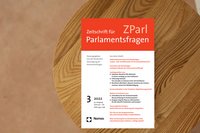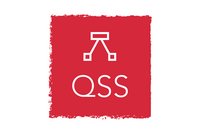gesis report 04/23
Liebe Leser*innen, unsere Meet-the-Experts-Reihe ist in vollem Gange. Dabei können sich Teilnehmende an qualitativ hochwertigen Online-Vorträgen zu sozialwissenschaftlichen Methoden und Forschungsdaten erfreuen. In unserer aktuellen Staffel präsentieren GESIS-Mitarbeitende interessante Vorträge rund um das Thema "Umfragedaten durch Verknüpfung und Harmonisierung erweitern". Bis zum Sommer sind noch drei weitere Termine verfügbar. Sollten Sie doch mal einen spannenden Beitrag verpasst haben, dann schauen Sie doch einfach auf unserem GESIS-YouTube-Kanal vorbei. Dort werden Mitschnitte der Vorträge stets zeitnah veröffentlicht. Abonnieren Sie einfach den Kanal und verpassen Sie keine neue Folge von "Meet the Experts". Viel Freude bei der Lektüre wünscht Ihre Redaktion | Dear readers, our "Meet the Experts" series is in full swing. Participants can enjoy high-quality online presentations on social science methods and research data. In our current season, experts at GESIS present interesting talks on the topic of "Extending survey data through linking and harmonization". Three more dates are available until summer. If you have missed an exciting presentation, just take a look at our GESIS YouTube channel. There, recordings of the lectures are always published promptly. Simply subscribe to the channel and never miss a new episode of "Meet the Experts". Enjoy reading! Your editorial team |
GESIS Summer School in Survey Methodology 2023 – Places AvailableThe GESIS Summer School 2023 will take place from 02 to 25 August 2023. Some courses will be held on-site in Cologne and some online. Join lecturers and participants from all over the world and from many different fields in meeting in person and online to take part in Europe's leading summer school in survey methodology, research design, and data collection. There is no registration deadline, but places are limited and allocated on a first-come, first-served basis. Week 0 (02 - 04 August) – Short Courses Pretesting Survey Questions [online] Mixed-Mode Surveys [online] Introduction to Stata for Data Management & Analysis [online] Causal Inference with Directed Acyclic Graphs (DAGs) [online] *** Week 1 (07 - 11 August) Designing, Implementing, and Analyzing Longitudinal Surveys [onsite] Applied Systematic Review and Meta-Analysis [onsite] Causal Inference Using Survey Data [onsite] (Non-)Probability Samples in the Social Sciences [online] *** Week 2 (14 - 18 August) Advanced Survey Design [onsite] Advanced Questionnaire Design [onsite] Introduction to R for Data Analysis [onsite] Missing Data and Multiple Imputation [online] *** Week 3 (21 - 25 August) Collecting and Analyzing Social Network Data [onsite] Data Science Techniques for Survey Researchers [onsite] *** | GESIS Training |
 | Neue Publikation: Dr. L. C. Wurthmann: Kooperation oder Abgrenzung? Einstellungen zum oppositionellen Umgang der CDU/CSU mit der Linken und der AfDSollte sich die CDU/CSU gegenüber der Linken und der AfD politisch öffnen? Diese Frage wird unlängst häufiger vor allem im Osten der Bundesrepublik Deutschland gestellt, obwohl beide Parteien, aber auch die gemeinsame Bundestagsfraktion, hierzu unmissverständliche Positionen haben. Der vorliegende Beitrag untersucht erstmalig auf Basis von Daten, die im Nachgang an die Bundestagswahl 2021 gesammelt wurden, wie seitens der Bevölkerung sowie unter jenen, welche die CDU/CSU als wahrscheinliche Wahloption betrachten, unterschiedliche Formen oppositioneller Zusammenarbeit als erste Öffnungsstrategie wahrgenommen werden. New publication: Dr. L. C. Wurthmann: Cooperation or Demarcation? Attitudes towards the CDU/CSU's oppositional behaviour to the Left and the AfDShould the CDU/CSU open up itself politically to the Left and the AfD? This question has recently been asked more frequently, especially in the east of the Federal Republic of Germany, although the CDU/CSU, as well as the common Bundestag parliamentary group, have unequivocal positions on this. This article examines for the first time, on the basis of data collected after the 2021 federal election, how different forms of oppositional cooperation between the Christian Democrats and the Left or the AfD are perceived by the population and among those who consider voting for the CDU/CSU as a viable option. |
 | GESIS bei der 9.Konferenz für Sozial- und Wirtschaftsdaten / 9KSWDDie 9|KSWD-Konferenz fand Ende März 2023 im dbb forum in Berlin-Mitte statt, an der auch viele GESIS-Mitarbeiter*innen teilnahmen. Mitveranstalter waren der RatSWD und KonsortSWD. GESIS-Präsident Christof Wolf hielt wie auch die RatSWD-Vorsitzende Monika Jungbauer-Gans ein Eröffnungsstatement. GESIS team at the 9th Conference on Social and Economic Data / 9KSWDThe 9|KSWD conference took place at the dbb forum in Berlin-Mitte in late March 2023. Co-Organized by the German Data Forum (RatSWD) and KonsortSWD, many from GESIS attended. Christof Wolf provided an opening statement alongside RatSWD’s chairwoman Monika Jungbauer-Gans.
|
 | Neue Publikation: Dietze, Mayr, Momeni et al.: Which Factors are Associated with Open Access Publishing? A Springer Nature Case StudyMomeni, F., Dietze, S., Mayr, P., Biesenbender, K., & Peters, I. (2023). Which Factors are Associated with Open Access Publishing? A Springer Nature Case Study. Quantitative Science Studies. https://doi.org/10.1162/qss_a_00253 Open Access (OA) erleichtert den Zugang zu Artikeln. Allerdings müssen Autor*innen oder Geldgebende häufig die Veröffentlichungskosten tragen, was Autor*innen, die keine finanzielle Unterstützung erhalten, daran hindert, sich an der Open-Access-Veröffentlichung zu beteiligen und Zitationsvorteile für Open-Access-Artikel zu nutzen. Open Access kann bestehende Ungleichheiten im Publikationssystem verschärfen anstatt sie zu beseitigen. New publication: Dietze, Mayr, Momeni et al.: Which Factors are Associated with Open Access Publishing? A Springer Nature Case StudyMomeni, F., Dietze, S., Mayr, P., Biesenbender, K., & Peters, I. (2023). Which Factors are Associated with Open Access Publishing? A Springer Nature Case Study. Quantitative Science Studies. https://doi.org/10.1162/qss_a_00253 Open Access (OA) facilitates access to articles. But, authors or funders often must pay the publishing costs preventing authors who do not receive financial support from participating in OA publishing and citation advantage for OA articles. OA may exacerbate existing inequalities in the publication system rather than overcome them. |
 | Neu erschienen: Bechert, Christmann, Kunz et al.: Plausibilisierung: Eine Handreichung zum Umgang mit inkonsistenten Daten in den SozialwissenschaftenBechert, Insa, Pablo Christmann, Andreas Franken, Fabio Franzese, Maarten Koomen, Kristina Krell, Tanja Kunz, Senta-Melissa Pflüger, Percy Scheller, Maximilian Trommer, und Christina von Rotz. 2023. „Plausibilisierung: Eine Handreichung zum Umgang mit inkonsistenten Daten in den Sozialwissenschaften“. Bausteine Forschungsdatenmanagement, Nr. 1 (März). German. https://doi.org/10.17192/bfdm.2023.1.8413. Die vorliegende Handreichung zeigt, dass in quantitativen, sozialwissenschaftlichen Erhebungen Unplausibilitäten entstehen können, die möglicherweise zu Auswertungsproblemen und Fehlanalysen führen. Out now: Bechert, Christmann, Kunz et al.: Plausibilisierung: Eine Handreichung zum Umgang mit inkonsistenten Daten in den SozialwissenschaftenBechert, Insa, Pablo Christmann, Andreas Franken, Fabio Franzese, Maarten Koomen, Kristina Krell, Tanja Kunz, Senta-Melissa Pflüger, Percy Scheller, Maximilian Trommer, und Christina von Rotz. 2023. „Plausibilisierung: Eine Handreichung zum Umgang mit inkonsistenten Daten in den Sozialwissenschaften“. Bausteine Forschungsdatenmanagement, Nr. 1 (März). German. https://doi.org/10.17192/bfdm.2023.1.8413. [only in German] This handout shows that implausibilities can arise in quantitative, social science surveys, possibly leading to evaluation problems and incorrect analyses. |
 | Jetzt verfügbar: Betaversion des Stamp - Standardisierter Datenmanagementplan für die empirische BildungsforschungDas Verbundprojekt Domain-Data-Protokolle für die empirische Bildungsforschung (DDP-Bildung) hat in Kooperation mit dem Verbund Forschungsdaten Bildung (VerbundFDB) im April eine Beta-Version des Standardisierten Datenmanagementplans für die empirische Bildungsforschung (Stamp) veröffentlicht: DDP-Bildung & Verbund Forschungsdaten Bildung (2023). Stamp – Standardisierter Datenmanagementplan. Version 0.9. Frankfurt am Main: DIPF | Leibniz-Institut für Bildungsforschung und Bildungsinformation. Verfügbar unter: https://www.forschungsdaten-bildung.de/stamp-nutzen Der Stamp steht Nutzenden in Form einer interaktiven pdf-Datei zur Verfügung, die über die Webseite des VerbundFDB abrufbar ist. Neben einem zip-Ordner mit allen Dateien zum Stamp finden sich dort auch die rechtlichen Vorgaben, Empfehlungen und Fallbeispiele ebenso wie das Glossar. Out now: Beta version of the Stamp - Standardized Data Management Plan for Empirical Educational ResearchThe collaborative project Domain Data Protocols for Empirical Educational Research (DDP-Bildung), in cooperation with the Collaborative Research Data Education (VerbundFDB), released a beta version of the Standardized Data Management Plan for Empirical Educational Research (Stamp) in April: DDP-Bildung & Verbund Forschungsdaten Bildung (2023). Stamp – Standardisierter Datenmanagementplan. Version 0.9. Frankfurt am Main: DIPF | Leibniz-Institut für Bildungsforschung und Bildungsinformation. Verfügbar unter: https://www.forschungsdaten-bildung.de/stamp-nutzen The Stamp is available to users in the form of an interactive pdf file that can be accessed via the VerbundFDB website. In addition to a zip folder with all the files for the Stamp, the legal requirements, recommendations and case studies can also be found there, as well as the glossary. |
 | Kickoff-Konferenz für eine Demokratiedaten-InfrastrukturAm 30. und 31. März fand in Wien die Kickoff-Konferenz des Konsortiums "Monitoring Electoral Democracy" (MEDem) statt. GESIS engagiert sich seit Jahren in diesem Konsortium, das in eine europäische Dateninfrastruktur für Demokratie- und Wahldaten münden soll. Es nahmen Forscher*innen von 37 Institutionen aus 23 Ländern teil. Kickoff conference for a democracy data infrastructureOn March 30 and 31, the kickoff conference of the Monitoring Electoral Democracy (MEDem) consortium took place in Vienna. GESIS has been involved in this consortium for years, which is to result in a European data infrastructure for democracy and election data. Researchers from 37 institutions from 23 countries participated. |
 | Neue Publikation: Fraser, Hobert, Jahn, Mayr, Peters: No Deal: German Researchers’ Publishing and Citing Behaviours after Big Deal Negotiations with ElsevierNicholas Fraser, Anne Hobert, Najko Jahn, Philipp Mayr, Isabella Peters; No Deal: German Researchers’ Publishing and Citing Behaviours after Big Deal Negotiations with Elsevier. Quantitative Science Studies 2023; doi: https://doi.org/10.1162/qss_a_00255 Im Jahr 2014 gründete ein Zusammenschluss deutscher Forschungsorganisationen das Projekt DEAL, ein Projekt auf nationaler Ebene zur Aushandlung von Lizenzverträgen mit großen Wissenschaftsverlagen. Die Verhandlungen zwischen DEAL und Elsevier begannen 2016 und scheiterten 2018 ohne eine erfolgreiche Einigung; in dieser Zeit kündigten rund 200 deutsche Forschungseinrichtungen ihre Lizenzverträge mit Elsevier, was Elsevier dazu veranlasste, den Zeitschriftenzugang für diese Einrichtungen zu beschränken. Out now: Fraser, Hobert, Jahn, Mayr, Peters: No Deal: German Researchers’ Publishing and Citing Behaviours after Big Deal Negotiations with ElsevierNicholas Fraser, Anne Hobert, Najko Jahn, Philipp Mayr, Isabella Peters; No Deal: German Researchers’ Publishing and Citing Behaviours after Big Deal Negotiations with Elsevier. Quantitative Science Studies 2023; doi: https://doi.org/10.1162/qss_a_00255 In 2014, a union of German research organisations established Projekt DEAL, a national-level project to negotiate licensing agreements with large scientific publishers. Negotiations between DEAL and Elsevier began in 2016, and broke down without a successful agreement in 2018; in this time, around 200 German research institutions cancelled their license agreements with Elsevier, leading Elsevier to restrict journal access at those institutions. |
 | E-Mail wird nicht richtig dargestellt? Jetzt im Browser anschauen! Eine Abbestellung des Newsletters "gesis report" ist jederzeit über diesen Link möglich: https://lists.gesis.org/mailman/listinfo/gesis-newsletter Sie können uns auch gerne eine E-Mail senden: pr(at)gesis(dot)orgDie Datenschutzhinweise von GESIS können Sie über folgenden Link einsehen: https://www.gesis.org/institut/datenschutz/ Display problems? No images? Open the newsletter in your browser! You can unsubscribe from the newsletter "gesis report" at any time via this link: https://lists.gesis.org/mailman/listinfo/gesis-newsletter You can also send us an e-mail: pr(at)gesis(dot)org The GESIS data protection information can be viewed via the following link: https://www.gesis.org/institut/datenschutz/ |

